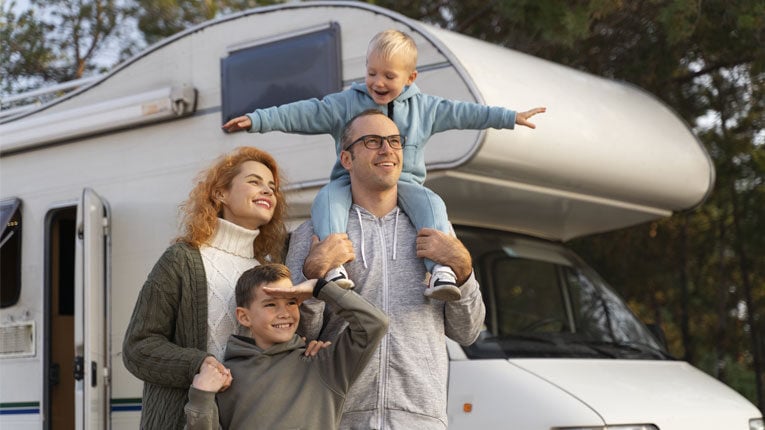If the thought of RV life has you dreaming of adventures on the road with friends and family, it might be time to finally say yes and consider buying an RV. But before you do, it’s important to do your research to ensure the perfect fit for your needs, so that you don’t experience the challenges first-time buyers often face.
8 Expert Tips for First-time Buyers
From fitting your budget and choosing the right brand, to familiarizing yourself with available features, amenities, and even financing; here are some tips to help you find the perfect RV for your outdoor and traveling adventures.
1: Assess Your RV Needs
When buying an RV, the most important thing is to choose one that will fit the outdoor lifestyle you plan to explore. There are many different style RVs, features, and floorplans to choose from, so determining exactly how you plan to use the space is crucial. For instance, if you plan to stay in state/national parks, want to explore more remote places, and spend a lot of time doing things outside of your RV, pay attention to boondocking features. This includes crucial features like electricity options and holding tank capacity. For those who plan a more stationary life, such as working remotely, considerations include electric/water hookups, a comfortable workspace, ergonomic seating, campgrounds, and Wi-Fi access.
2: Choose the Right Type of RV
With the variety of different options available, buying an RV can be overwhelming. Once you determine your living style and needs, you can choose from different RV styles including these popular choices.
-
Motorhome – Built using a commercial truck or bus chassis, the Class A motorhome is the largest type of RV. Class A motorhomes range in length from 20 to 45 feet. The homestyle amenities, such as open floor plans, washers and dryers, dishwashers, spacious bedrooms, and large storage make motorhomes the most like a traditional home. It's a great choice for those who often travel, have small families, or those who want luxury on the road.
-
Campervans – These are the smallest types of RV. Ranging in size from 17 to 24 feet long, they offer perks including great gas mileage, and easy drivability and parking. Campervans typically include a small kitchenette, bed, bathroom, toilet, and sink. The fun-sized campervans are perfect for solo travelers or couples since space and storage is somewhat limited.
-
Fifth Wheel – This camper attaches to the bed of a truck, which gives it the unique split-level floor plan they're known for. Fifth wheels range in size from 12 to 40 feet long and have home like amenities such as kitchens and bathrooms. Some models even offer a separate bedroom. When buying an RV, the fifth wheel is a great choice for families or groups who travel together due to the large size, ample storage, and privacy options.
- Travel Trailer – This easy to use RV can be towed by SUVs and smaller trucks depending on the size. It comes equipped with a kitchen, bathroom, and living/sleeping area. When buying an RV, travel trailers are a great choice for those who like to take off and explore as they easily hitch/unhitch from your towing vehicle. Fun for couples or small families, the travel trailer comes in a variety of sizes to fit your needs.
- Pop Up Campers – Also referred to as "fold-down campers" or "tent trailers," these compact RVs feature extendable side sections that fold down for easy transportation. Pop up campers vary in length ranging from 8 to 16 feet long. The hard-bodied mid-section contains a basic kitchen and bathroom while the tented sides convert to sleeping quarters. This compact RV is best suited for solo travelers, couples, or small families who enjoy occasional camping adventures.
3: Set a Realistic Budget
The most important thing to consider when buying an RV is your budget. In your purchase you should account for any upfront expenses, financing options, and monthly payment. You’ll also want to consider recurring costs for the upkeep that include maintenance, registration, insurance, storage, etc. Also included in RVing are costs of living such as campground fees, fuel cost, groceries, internet service, pets, and more.

4: Research RV Models and Brands
Doing research is the best way to find the perfect fit when buying an RV. Not only should you gather information online and read reviews on various models and brands, but also take the time to visit your local RV dealership. Talk to the salespeople for tips, recommendations, and brand knowledge. Explore the different models to see your choices of the different layouts, lengths, and features. Once you’ve familiarized yourself with your options, go online to check reviews and compare prices to see which will work best for your outdoor adventures.
5: Understand RV Features and Amenities
Comfort, safety, and functionality are the key things to look for when buying an RV. It’s also a good idea to research the features and amenities so you’ll know exactly what you want when buying an RV. Choosing the right amenities to add to your comfort level is important. Consider features like full bathroom and kitchen facilities, a separate bedroom versus fold-down tables that create beds, upgraded seating areas, fireplaces, laundry facilities, tank size for your water supply, solar panels or a generator for frequent boondocking, and more.
6: Inspect and Test Drive RVs
Once you’ve researched and chosen a dealer, it’s time to start shopping and test driving. When buying an RV, a thorough inspection and test drive is a smart move. The inspection should be performed by a professional RV inspector/mechanic and should include all interior and exterior features – everything from the roof to the tires and all the electrical, mechanical, and plumbing components. It’s also important to test drive the RV to ensure its mechanical integrity and that it's a good fit for your RVing skills. Red flags to look for include cracked tires, exterior or interior damage, roof deterioration, lack of service records, high mileage, and ceiling, wall or floor stains. All of these items require a closer look to ensure there are no major issues.
7: Negotiate the Purchase Price
When buying an RV, negotiating the best deal possible starts with knowing the best time to buy. Late summer and fall offer better deals compared to the beginning of the vacation season in the early summer. Next, knowing the NADA (National Automobile Dealers Association) value of the RV you have interest in is key for negotiating a fair price at the dealer. Stick to your budget and be firm as to what you're willing to spend and what you can afford so dealerships know the number they need to meet to close the deal.
Ask for add-ons to be included like sewer hoses, leveling blocks, and surge protectors when buying and negotiating the RV price. Also, be sure to have the inspection report from your professional RV inspector indicating things that need attention and use this as part of your negotiating tactics.

8: Finance Your RV
While you can typically get financing from your RV dealer, consider other options like your credit union who offer RV loans with great rates and terms. You should be familiar with the latest interest rates and also the loan terms that are available when financing to get the best deal. Be sure to ask your local credit union about added benefits such as extended warranties, GAP coverage and discounted insurance offerings.
Make Buying Your RV a Breeze with Peach State
Whether you're chasing sunsets or campfire stories, our team is here to help you finance your dream RV. We offer great rates and flexible terms that'll fit your budget. If you're ready to hit the great outdoors and start your RVing adventures, be sure to get pre-approved today!




